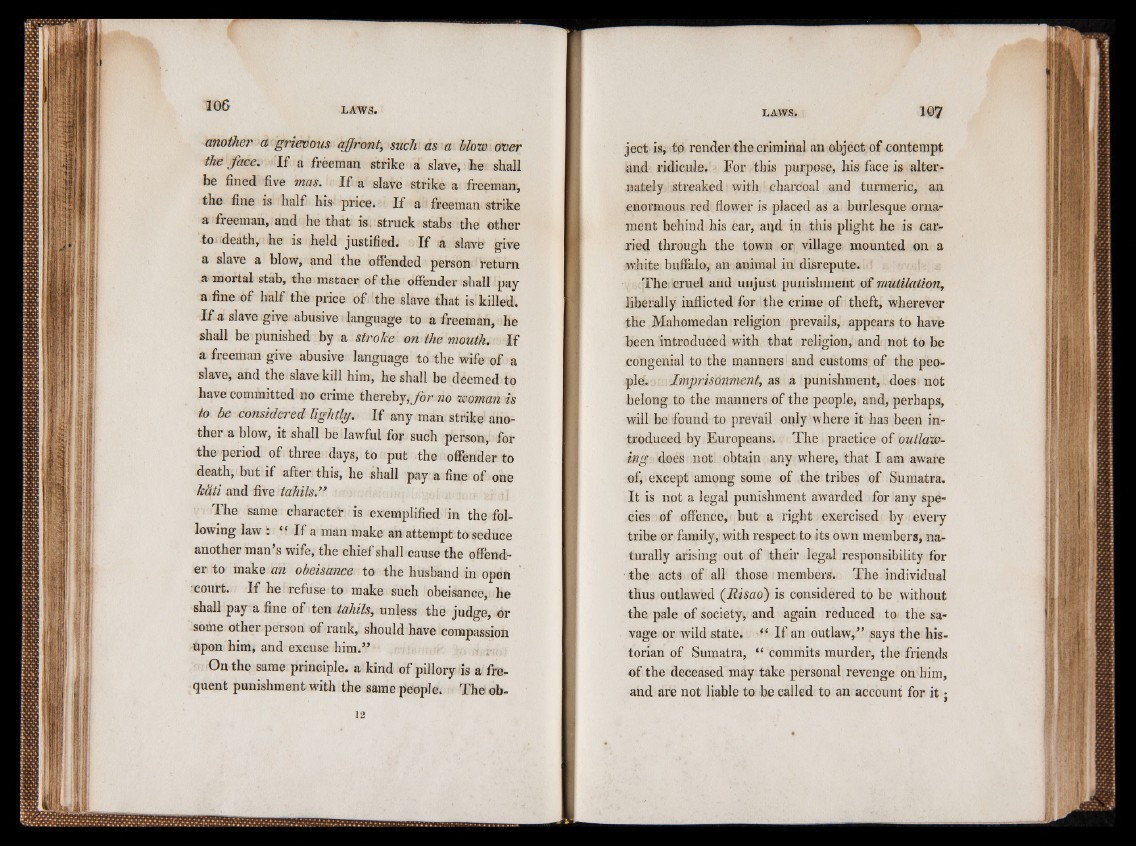
another a grievous affront, such as a blow over
the face. If a freeman strike a slave, he shall
be fined five mas. If a slave strike a freeman,
the fine is half his- price. If a freeman strike
a freeman, and he that is, struck stabs the other
to< death, he is held justified. If a slave give
a slave a blow, and the offended person return
a mortal stab, the mstaer of the offender shall pay
a fine of half the price of the slave that is killed.
If a slave give abusive language to a freeman, he
shall be punished by a stroke on the mouth. If
a freeman give abusive language to the wife of a
slave, and the slave kill him, he shall be deemed to
have committed no crime thereby, for no woman is
to be considered lightly. If any man strike another
a blow, it shall be lawful for such person, for
the period of three days, to put the offender to
death, but if after this, he shall pay a fine of one
kati and five tahils.”
The same character is exemplified in the following
law : “ If a man make an attempt to seduce
another man’s wife, the chief shall cause the offender
to make an obeisance to the husband in open
court. If he refuse to make such obeisance, he
shall pay a fine of ten tahils, unless the judge, or
some other person of rank, should have compassion
upon him, and excuse him.” . ;
On the same principle, a kind of pillory is a frequent
punishment with the same people. The ob12
ject is, to render the criminal an object of contempt
and ridicule. For this purpose, his face is alternately
streaked with charcoal and turmeric, an
enormous red flower is placed as a burlesque ornament
behind his ear, arid in this plight he is carried
through the town or village mounted on a
white buffalo, an animal in disrepute.
The cruel and unjust punishment of mutilation,
liberally inflicted for the crime of theft, wherever
the Mahomedan religion prevails, appears to have
been introduced with that religion, and not to be
congenial to the manners and customs of the people.
Imprisonment, as a punishment, does not
belong to the manners of the people, and, perhaps,
will be found to prevail only where it has been introduced
by Europeans. The practice of outlawing
does not obtain any where, that I am aware
of, except among some of the tribes of Sumatra.
It is not a legal punishment awarded for any species
of offence, but a right exercised by every
tribe or family, with respect to its own members, naturally
arising out of their legal responsibility for
the acts of all those members. The individual
thus outlawed (Risao) is considered to be without
the pale of society, and again reduced to the savage
or wild state. (( If an outlaw,” says the historian
of Sumatra, “ commits murder, the friends
of the deceased may take personal revenge on him,
and are not liable to be called to an account for i t ;